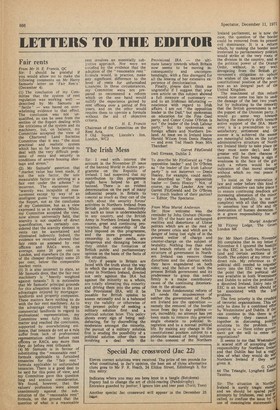Fair rents
From Mr H. E. Francis, QC
Sir: I should be grateful if you would allow me to make the fcllowing comments on Mr Harry Samuels' letter on Fair Ren's (December 4).
(1) The conclusion of my Committee that the system of rent regulation was working well — described by Mr Samuels as 'facile" — was based on overwhelming evidence to that effect. The conclusion was not unqualified, as can be seen from the section of the Report dealing with the criticisms of the system and its machinery, but, on balance, my Committee accepted the view of the Chartered Land Societies Committee that it was "the most practical and realistic system which has so far been devised to deal with the very difficult problems of rents and security in conditions of severe housing shortage and stress."
(2) Mr Samuels' assertion that "market value has been made, if not the sole factor, the sole measurable factor in arriving at a fair rent under the scheme " is incorrect. The statement that "scarcity was incapable of measurement except by way of an intelligent guess " was inserted in the Report, not as the conclusion of my Committee, but as a view expressed to us in evidence. Whilst my Committee accepted the view, now almost universally held, that scarcity is not capable of direct quantification, we certainly considered that the scarcity element in rents can be ascertained and eliminated indirectly. Indeed, the evidence we received showed that fair rents as assessed by rent officers and RACs were, on average, some 20 per cent in London, and elsewhere (in the case of the cheaper dwellings) some 25 per cent, below the comparable market rents.
(3) It is also incorrect to state, as Mr Samuels does, that the fair rent machinery is "heavily weighted against tenants." It is noticeable that Mr Samuels' principal grounds for this allegation relate to the tax advantages enjoyed by mortgagorlandlords and property companies. These matters have nothing to do with the fair rent machinery. As to the advantage enjoyed by large commercial landlords in regard to professional representation, my Committee went fully into this matter and reached the conclusion, supported by overwhelming evidence, that tenants do not as a rule suffer from lack of professional representation either before rent officers or RACs, any more than they do before rent tribunals. (4) Mr Samuels is in favour of substituting the "reasonable rent" formula applicable to furnished tenancies for the "fair rent" formula applicable to unfurnished tenancies. There is a good deal to be said for this point of view, and my Committee gave this question long and anxious consideration.
We found, however, that the valuers' profession were almost unanimously against the sub stitution of the " reasonable rent" formula, on the ground that the question of what is a reasonable rent involves an essentially subjctive approach. Nor were we satisfied by the evidence that the adoption of the "reasonable rent" fcrmula would, in practice, make any significant difference to the level of rents for unfurnished t,:nancies. In these circumstances, my Committee were not prepared to recommend a reform which on the one hand would nullify the experience gained by rent officers over a period of five years, and on the other would require them to cperate a formula without the aid cf objective criteria.
H. E. Francis Chairman of the Committee on the Rent Acts.
9 Old Square, Lincoln's Inn, London, WC2










































 Previous page
Previous page